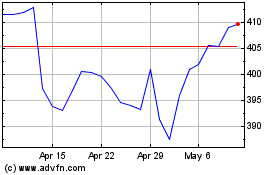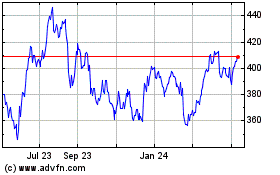By James R. Hagerty
Hans Becherer stood out from most of the Midwestern lifers at
Deere & Co. Though he grew up in the Detroit suburbs, he was a
graduate of the Harvard Business School, drove imported cars and
knew his way around the capitals of Europe.
After he became chief executive of the farm-equipment maker in
1989, he spurred investments in China, Brazil and other emerging
markets. To help make sales, he made regular trips around the world
to meet leaders, including Nursultan Nazarbayev, the president of
Kazakhstan, who gave him a bear hug. He won more flexible work
rules from unions.
Mr. Becherer (pronounced Becker-er) died Oct. 6 at home in
Denver. He was 81 and had esophageal cancer.
Hans Walter Becherer was born April 19, 1935, and grew up in
Grosse Pointe, a wealthy suburb of Detroit. Both of his parents
were born in Germany, and his father worked as an electrical
engineer. Young Hans pumped gas and worked construction in the
summer. He earned a history degree in 1957 from Trinity College in
Hartford, Conn., where he was president of a fraternity that he
later said was known for wild parties but also held literary
discussions.
After joining the Air Force, he served as a supply officer in
Germany, near Munich. While there, he bought his first sports car:
an Alfa Romeo Spider Veloce.
During a vacation with his sister, Ruth, near St. Tropez,
France, he spotted a young Parisian, Michele Beigbeder, who worked
as a ballerina and model. He introduced himself. They began dating
and married two years later. Her father invited him to a business
lunch, where he met a Deere executive.
Returning to the U.S., he enrolled at Harvard Business School.
During a summer break, he worked as an intern for Deere. After
getting his masters of business administration in 1962, he drove
his Renault Dauphine to Moline, Ill., to take a full-time job at
Deere at $650 a month.
Soon he was posted to Germany as a sales manager. At times, he
had to serve as an intermediary between Germans and Americans. A
plant manager from Moline was astounded to see workers on a German
shop floor taking beer breaks. He ordered tight restrictions on
such breaks, setting off a brief walkout that became known as the
Beer Strike.
"The technical people came out of small-town, middle-American
factories with very little appreciation for communication
sensitivities," Mr. Becherer later told The Wall Street
Journal.
As a promising young executive, he was brought back to Moline in
1967 as an assistant to William Hewitt, the company's cosmopolitan
chairman who also had attended Harvard and adorned the headquarters
with expensive art, including a Henry Moore sculpture. On later
postings, Mr. Becherer scoured Eastern Europe, the Middle East and
Africa to find new customers. He was involved in bartering Deere
combines for jute in India.
After returning to the head office, he won a series of
promotions in the 1970s, when Deere sales boomed, and in the 1980s,
when a farming slump forced the company to cut its payroll by more
than a third. He rose to chief executive in 1989 and chairman the
next year, becoming only the seventh chief of the company founded
in 1837 to make steel plows.
Deere, still rattled by the devastating slump of the 1980s,
remained in cost-cutting mode, but Mr. Becherer and the board
agreed the company couldn't shrink its way to prosperity. So Deere
invested in operations in Brazil, China, India and Russia. Mr.
Becherer also prodded Deere engineers to overhaul the design of
combine harvesters, including by adopting some ideas from
competitors, a deeply unpopular notion.
One of his dreams was to build a state-of-the-art training
center. It would have been his legacy, alongside the elegant
glass-and-steel headquarters built by his early patron, Mr. Hewitt.
The board nixed the idea as too costly.
He served on the boards of Allied-Signal Inc., Schering-Plough
Corp. and Chase Manhattan Corp. He retired from Deere in 2000.
Not long after his retirement, he golfed with Robert Hanson, his
predecessor as CEO, at the Deere Run golf course in Silvis, Ill.,
where the company sponsored golf tournaments. When a golf course
employee didn't recognize him as a Deere grandee, Mr. Becherer was
vexed. Mr. Hanson was less surprised. "He doesn't know yet that
when you're no longer CEO you go from Who's Who to Who's That?" Mr.
Hanson said, according to another colleague who was present.
Adapting to anonymity, Mr. Becherer and his wife spent their
later years in Denver to be near their grandchildren. He enjoyed
fly fishing and walks with his labradoodle, Bruno.
He is survived by his wife, a daughter, a sister and three
grandchildren. A son, Maxime, died in 1998.
Days before his death, after he had already gone into hospice
care and was finding it hard to talk, Mr. Becherer got a phone call
from Pierre Leroy, a former Deere colleague and longtime friend
with whom he had shared Thanksgiving meals and long bike rides.
"Pierre," he managed to rasp, "we really had fun, didn't we."
Write to James R. Hagerty at bob.hagerty@wsj.com
(END) Dow Jones Newswires
October 28, 2016 10:14 ET (14:14 GMT)
Copyright (c) 2016 Dow Jones & Company, Inc.
Deere (NYSE:DE)
Historical Stock Chart
From Mar 2024 to Apr 2024

Deere (NYSE:DE)
Historical Stock Chart
From Apr 2023 to Apr 2024
